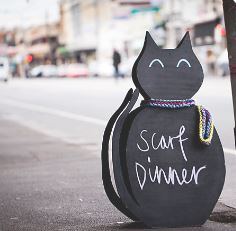Hospitality training for migrants, refugees
A new Melbourne social enterprise is giving people from diverse backgrounds the opportunity to break into the hospitality industry.
Scarf is a not- for- profit enterprise established to provide hospitality experience and mentorship to new migrants, refugees, asylum seekers and people with disabilities through a series of workshops and hands on classes.
 The ten-week course is free and includes the paid stints in borrowed restaurants to give students the chance to practice skills such as running food, bar and looking after both tables and guests.
The ten-week course is free and includes the paid stints in borrowed restaurants to give students the chance to practice skills such as running food, bar and looking after both tables and guests.
“Young people get hands on experience and real confidence to get real industry jobs,” the Scarf website says.
After the Scarf course trainees get to put their training into practice using a series of weekly dinners held at a new Melbourne restaurants every season.
The Scarf website reads: “Nobody says come to our restaurant; we’ve got really interesting waiters.”
Hannah Colman the Co-founder of Scarf explains that “trainees usually come from marginalised backgrounds” and this training often allows them to gain “meaningful employment”.
“The trainees are referred to us through places such as the Asylum Seeker Resource Centre, Brotherhood of St Laurence and Melbourne City mission,” Ms Colman said.
Scarf trainees learn from some of the best in the hospitality industry as they are guided through wine courses, beer and cider training at Little Creatures Dining Hall, cocktail training at Cookie and bar service training at Mr Wow’s Emporium.
Ricky Holt who has been working with Scarf since 2011 says that, “working with the trainees is a fulfilling experience.”
“They do it in a space where creativity thrives; individuality reigns and high fives are just part of the process,” the SCARF website says.
Trainees are brought together with mentors who are keen to share their knowledge and build their networks.
Past Scarf trainees have gone to work at a number of hospitality venues such as Number 35 in the Sofitel, Church St Enoteca, Cumulus Up and the Garden State Hotel.
In fact, Hannah Colman notes that “two/thirds of the Scarf alumni have gone to work in the hospitality industry”.
Yusek Felle, a West Papuan migrant who spent years on a student scholarship in Canberra was referred to Scarf through the Brotherhood of St Laurence after political struggles in his country.
Whilst he was allowed to settle in Australia, finding ongoing employment has been an issue for him.
“To be in this program will provide me with a lot more of a chance to get a job in the hospitality industry,” Yusek said.
David Hynes, one of Scarf’s employment mentors and ex-restaurant owners, says that “I see Scarf as trying to fill the gaps that are left by existing government programs for hospitality venues and people who don’t usually have access to that”.
“Having the right attitude is the thing that ties the trainees together,” Mr Hynes said.
“Even if they don’t know what pinot is, they’re really excited to learn,” he said.
Spring Scarf Dinners will run on Tuesday nights at Auction Rooms in North Melbourne from 26th of September to the 21st of November.
The Auction Room’s chefs will be preparing a two course set menu for only $45 per person.
If you would like to book a Scarf dinner please email bookings@scarfcommunity.org or call 0488 772 911.
“While we can’t promise there will be no drips of wine or a perfect reciting of the menu, we can promise a unique, heartening, woolly and totally tasty evening,” the SCARF website says.
Magy Mekhaiel












